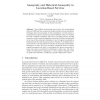Free Online Productivity Tools
i2Speak
i2Symbol
i2OCR
iTex2Img
iWeb2Print
iWeb2Shot
i2Type
iPdf2Split
iPdf2Merge
i2Bopomofo
i2Arabic
i2Style
i2Image
i2PDF
iLatex2Rtf
Sci2ools
130
click to vote
ESORICS
2009
Springer
2009
Springer
Anonymity and Historical-Anonymity in Location-Based Services
The problem of protecting user's privacy in Location-Based Services (LBS) has been extensively studied recently and several defense techniques have been proposed. In this contribution, we first present a categorization of privacy attacks and related defenses. Then, we consider the class of defense techniques that aim at providing privacy through anonymity and in particular algorithms achieving "historical k-anonymity" in the case of the adversary obtaining a trace of requests recognized as being issued by the same (anonymous) user. Finally, we investigate the issues involved in the experimental evaluation of anonymity based defense techniques; we show that user movement simulations based on mostly random movements can lead to overestimate the privacy protection in some cases and to overprotective techniques in other cases. The above results are obtained by comparison to a more realistic simulation with an agent-based simulator, considering a specific deployment scenario....
Related Content
| Added | 17 Feb 2011 |
| Updated | 22 Dec 2011 |
| Type | Journal |
| Year | 2009 |
| Where | ESORICS |
| Authors | Claudio Bettini, Sergio Mascetti, Xiaoyang Sean Wang, Dario Freni, Sushil Jajodia |
Comments (0)

